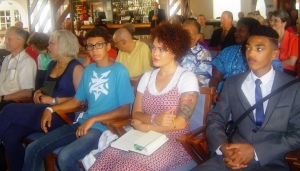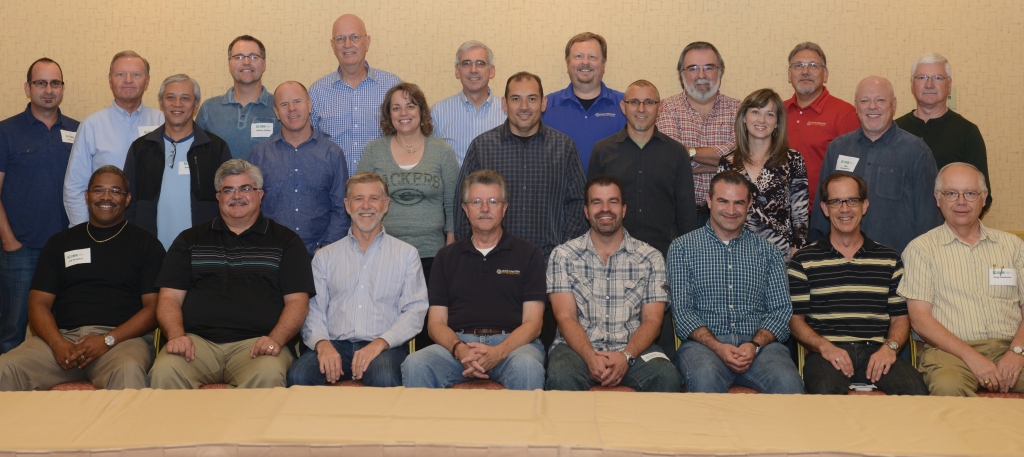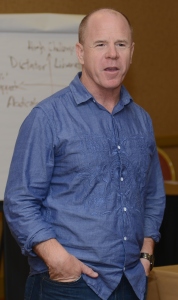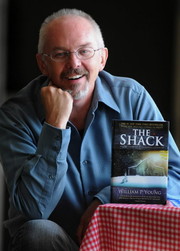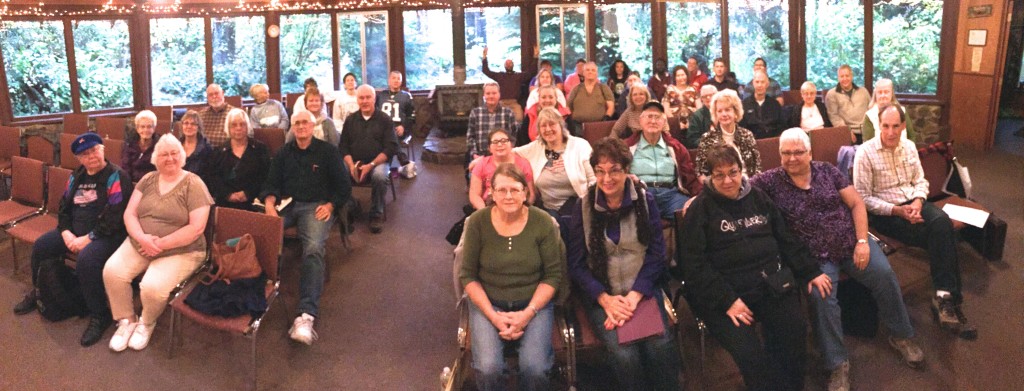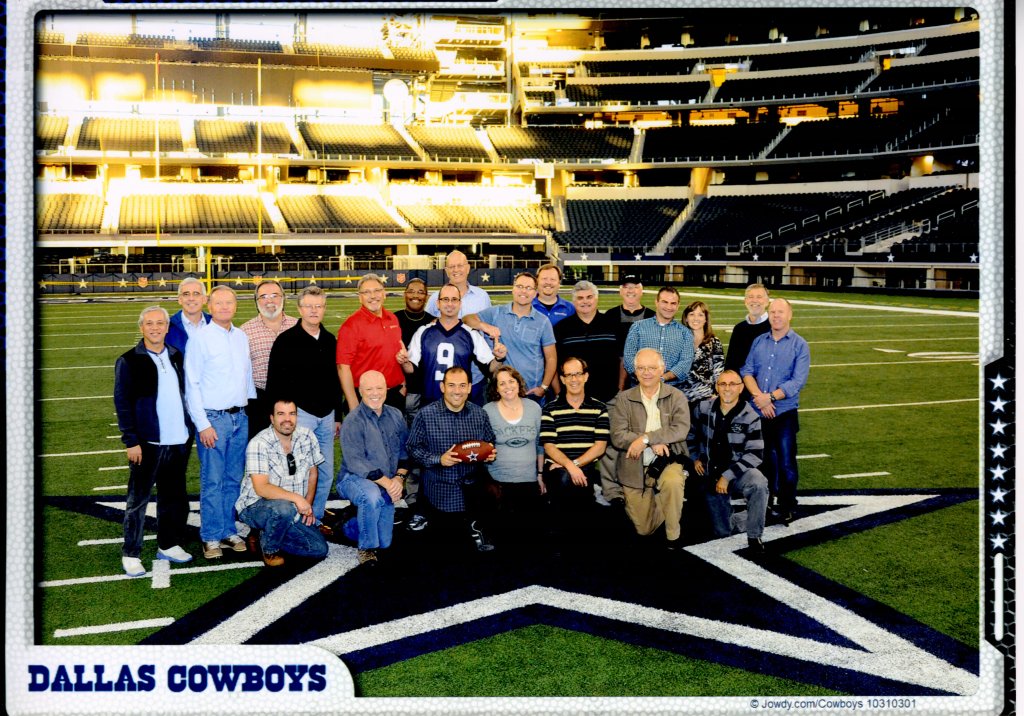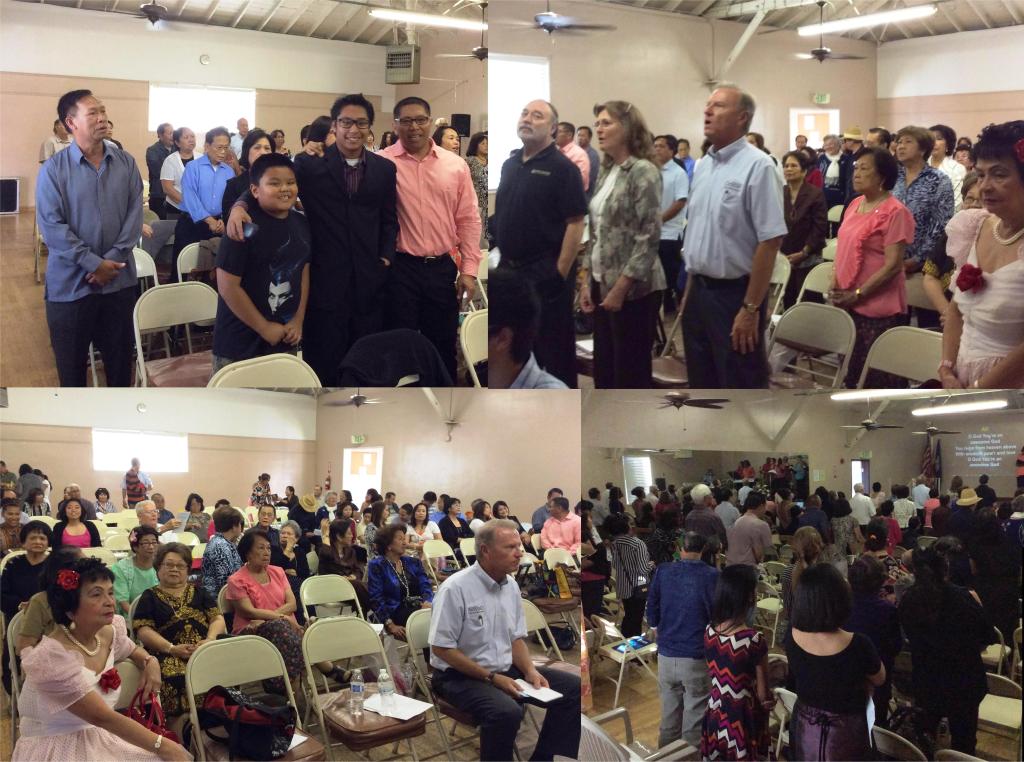150 GCI members, family and friends from 12 countries gathered recently in Majorca, Spain, for a worship festival with the theme, A Celebration of God’s Love and Grace in Jesus Christ. The messages were Christ-centered and practical. Members gave personal testimonies about what God is doing in their lives and churches. Festival activities included tours of Bellver Castle, Palma city’s historical quarters, an olive-wood craft factory and a pearls factory. The group also enjoyed a talent show where a good number of members performed followed by a family dance. Some hotel clients and personnel attended some of the services and the talent show. The bonds of love experienced by the group were enhanced by all staying in the same hotel.
Year: 2014
Church planting summit
Last week, 24 church pastors, regional pastors and GCI ministry leaders (see picture below) gathered in Dallas, Texas, for a summit to discuss our continuing journey as a church planting movement. The summit, hosted by GCI Church Multiplication Ministries (CMM), helped clarify and advance a shared vision for church renewal and church planting.
Church planting consultant Tom Nebel (pictured at left), formerly the director of church planting for Converge Worldwide, addressed the summit, reminding the group that when we are on mission, we will always be engaged in mission-focused ministry. Tom provides coaching and consultation to CMM leaders.
During the summit, participants discussed how congregations, regional networks and CAD ministries (including CMM) can work together to help new GCI churches start and to help established GCI churches experience missional renewal. Also during the summit, long-time CMM leader Randy Bloom “passed the baton” as CMM national coordinator to GCI church planter Heber Ticas (see picture below). To learn more about Heber, click here.
In his new role, Heber will be responsible for coordinating the work CMM does in equipping church planters and helping GCI-USA churches and regional networks partner in an ongoing church planting movement. Randy, who will continue to be part of CMM’s leadership team, will be one of six regional pastors serving GCI pastors and congregations within the U.S.
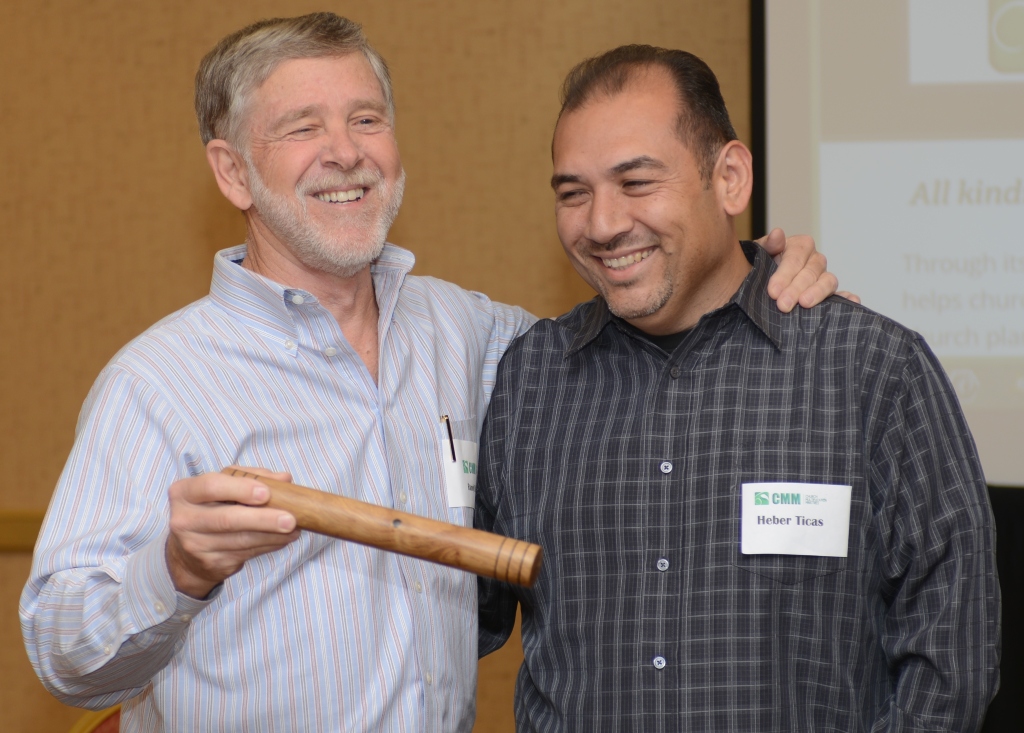
Converge 2015 – registration open
All GCI members, families and friends are invited to Converge 2015. We are expecting a capacity crowd, so don’t delay—register now at https://gci.org/go/converge15 (sign-in required).
Converge is an annual gathering hosted by GCI Generations Ministries. It has always been an amazing time of worship and fellowship in the triune love of Father, Son and Holy Spirit. We anticipate that 2015 will be the best ever. Because there will be no U.S. regional conferences in 2015, we’re opening Converge 2015 to a general church audience. Converge is no longer just for youth ministry types!
In 2015, Converge will be held on March 20-22 in one location—beautiful Deer Creek Lodge and Conference Center located near Mt. Sterling, Ohio, 30 minutes south of Columbus. The facility has over 3,000 acres with hiking, fishing, boating and golf. The entire facility will be ours that weekend, including their 110 hotel-style lodge rooms. To see pictures of the lodge rooms click here.
Converge 2015 will have something for everyone, no matter your age or ministry focus. Guest speaker Paul Young (pictured at left), author of The Shack, will share the jaw-dropping, life-changing, epic story of the gospel. GCI president, Joseph Tkach will also address one of the plenary sessions and there will be workshops focused on all kinds of ministry renewal needs: youth ministry, camp leadership and management, worship leading, intro to Christian leadership, theology and practice, missional life flow, children’s ministry, GCI Internships, camp curriculum, ministry coaching and more. Childcare will be provided so you can have uninterrupted time at plenary sessions and workshops. To take advantage of this service, provide the names and ages of your children when you register.
Converge 2015 begins at 7:00 P.M. EST on Friday, March 20 and concludes at noon EST on Sunday, March 22. It’s important to arrive early enough to check in prior to the opening session. If flying to Converge, the Port Columbus International Airport (CMH) is only 45 miles north. GenMin will provide limited transportation to and from CMH on a first-come, first-served basis at $12/person ($20/couple/family). If you want transportation, email Jeff Broadnax at jeffrey.broadnax@gci.org. The Dayton and Cincinnati airports are also within reasonable distance.
Converge registration allows individual or group registration. The lowest cost option of $175/person is available when four people share one lodge room. The cost for single occupancy is $328/person. These costs include registration, two-nights lodging and the meal package (four meals). If you want to share lodging, please register as a group, listing the names of all the group members, then pay the fee for the entire group. If you desire to stay an extra night before Converge starts, please notify us when registering. Questions about registration? Email Anthony Mullins at anthony.mullins@gci.org or text him at 678.427.9967.
Regarding scholarships or otherwise giving people financial assistance to attend Converge 2015, why not partner as a church, camp or mission event?
Once again, to register, go to https://gci.org/go/converge15 (sign-in required).
Emmanuel Okai

Many of us have heard the stories, “When I was your age I used to walk to school, two miles each way, barefoot.” For Emmanuel Okai, GCI pastor in Accra Ghana, this was his way of life growing up. “My early life was typical of many children in a developing country like Ghana. I lived in a village where there was no electricity, no pipe-borne water, no paved roads. There was only one radio in the community and all of us would cram around it to listen to football commentaries or to popular music. Every day for the first ten years of my educational career, I walked two miles each way to school in the nearby small town of Akwadum.”
Emmanuel was born in a cocoa-farming village in central Ghana in a hamlet so small it’s not on any map. “My parents were both peasant farmers. My father was a renowned linguist (spokesman) for the chief of Anum-Toseng, our ancestral hometown, a herbalist and well respected elder of his community. I was only four when he died. Therefore, most of my growing up was under the care of my mother, an enterprising woman who would do any odd job to take care of me, her only son. I grew up in the eastern part of Ghana in my maternal grandfather’s village, where I enrolled in elementary school when I was seven.”
Emmanuel has one biological sister and three stepsisters along with several cousins, all who made up their African family system. “It was a period when I had a lot of fun as we learned many survival skills such as farming, swimming, setting traps to catch game, playing several types of games and learning to live in community and dealing with boys and girls who would tease each other. There were a few reckless moments though: One such led me face to face with a spitting cobra ready to strike at me – I was about 10 years old – when we went chasing lizards around our village! That early experience showed me how much God protects his little ones. The snake just recoiled and ran off when I shouted in despair. My early life experiences gave me the confidence to take care of my life, to be independent, to think for myself, to find ways to survive, to become enterprising and to believe in God. I developed a very optimistic positive outlook to life during my teen years as a result of my avid reading habits. I almost always look at the ‘doughnut’ and very rarely the ‘hole’ in any situation.
Those reading habits brought Emmanuel’s attention to The Plain Truth magazine. Emmanuel’s parents were originally practitioners of African traditional religion, but his mother became a Pentecostal Christian—a faith she held until her death in 1997. “I was a first year student in a teachers’ college supervised by the Presbyterian Church. I had a lot of interest in reading and so when one of my friends brought old copies of The Plain Truth that his brother received, I devoured everything in each copy. Eventually, I subscribed to The Plain Truth, The Good News and requested several church booklets. I still recollect the impact on my youthful mind of such booklets as “Why Were You Born?” and the “The Seven Laws of Success.” I began to take Christ more seriously.”
Emmanuel did well in school because of his mother’s support. “She saw so much potential in me and she, along with my step-father and step-sisters, supported me at the most critical periods of my life.” At age 20, Emmanuel started work as an elementary school teacher. “Since then I have been independent. I also owe a lot to the famous Pan-Africanist first President of Ghana, Dr. Kwame Nkrumah, who introduced free education in Ghana in 1960, when I was in second grade. As a result, I had free tuition throughout my education career, including earning a degree from the University of Cape Coast. Without this policy of free education, I doubt if I could have reached where I am today.”
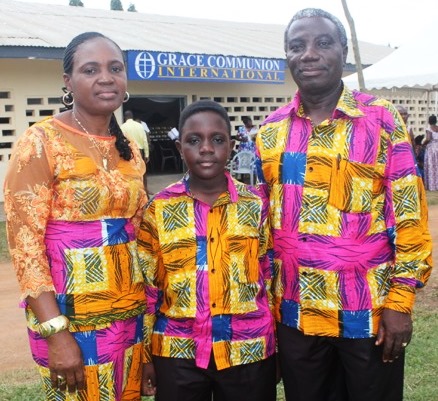
Emmanuel was 16 when he first met Margaret, the cousin of one of his childhood friends. “The very first time I saw Margaret, I told my friend, ‘This is my wife.’ Those were teenage fantasies. However, several years later, during my first year in university, when she had also completed high school, we met again; we became friends and later got married on June 30, 1979. We had challenges with regard to having children. We prayed, counseled and saw many doctors in Ghana, Nigeria and the US. In 2004, God blessed us with our only son, Nana Yaw, who is now in fifth grade. We have many ‘grand-children’ through the many young people we have taken care of as part of our traditional extended family obligations.”
Emmanuel became part of GCI in September 1975 when he was baptized at the Feast of Tabernacles held in Ghana at the University of Cape Coast. A few years later, he and Margaret migrated to Nigeria to work as teachers. “We joined the church in Lagos where we supported the pastor Lateef Edalere and his wife Yvonne in the children and youth programs of the church. Eventually we assisted in running a few youth camps in Nigeria during our six years there. Partly due to this involvement, Pastor Edalere recommended and we were given scholarships to attend Ambassador College in Pasadena from 1986 to 1989. The experiences at AC were some of the most life-changing in our lives because we saw how real leaders lived their lives as true Christians—humble, selfless, charitable leadership.” After graduating from AC, Emmanuel served as a ministerial trainee in Los Angeles under Pastor Abner Washington for a year. He then returned to Ghana and served for 10 months under Pastor Melvin Rhodes. He was ordained an elder in 1990 in Accra, Ghana.
Emmanuel says this of Margaret’s role in ministry: “Margaret is very much central to my ministry. She is the sounding board to all ideas I generate, my biggest critic and my greatest encourager. She does almost all the background work at home and during many programs of the church. Her feminine sensitivity has enabled me to grow a balanced ministry, which is gender-sensitive. She is my adviser, encourager and friend in the vineyard of the Lord.”
When asked what he enjoys most about being a pastor, Emmanuel said, “Seeing members overcome challenges, as a result of our support and their obedience to God. When I see a young child grow, mature and develop in the Lord, when I see changed lives; those bring me joy. Also, sharing the joys of our members in such incidents of life as marriage, child naming and blessing and other similar celebrations.” This fits in with Emmanuel’s passion which is “teaching and finding creative ways of doing the work of God; and in training/mentoring the next generation of leaders, including the youth and children.”
Emmanuel also loves being part of GCI. “There is a close bond of friendship within GCI that I enjoy very much. Right now, most of those I consider to be truly friends are in GCI. There is a sincere warmth and love among fellow members of GCI.”
His most memorable moment as pastor took place recently. “Successfully hosting the large delegation of visitors, including my mentors, the Washingtons and Mrs. Yvonne Edalere, during the recent 40th anniversary celebrations of GCI Ghana in August 2014. Hosting three families in our home for that occasion was a dream come true for Margaret and me.”
Emmanuel chuckles when he thinks about where he is in comparison to all he’s done. “Over the 62 years, I have been a teacher, trader, farmer, tour operator, school owner, bi-vocational pastor among other jobs. However, as a young person, I swore never to do three jobs: policeman, teacher and priest. God had other ideas and now the two jobs I love and enjoy most are teaching and being part of the priesthood of Christ.”
Emmanuel says he feels closest to God “when reading the Bible or commentaries on aspects of the Bible that deal with the nature of God. Also, when I am in the natural environment.”
Fundraising for ministry
As we participate with Jesus in the Father’s mission to the world, we encounter the need for finances to support the ministries that give focus to our participation. Fundraising is an important ministry activity that more and more of us are learning about and actively participating in. In the video below, GCI-USA pastor Sam Butler talks about his fundraising experience, noting that though he initially resisted it, he now sees it as a vital and fruitful part of his congregation’s ministry to the community.
On Youtube at http://youtu.be/g8nlCjuZcak.
commUNITY retreat
About 70 participants (pictured below) from six GCI congregations in the Northwest gathered recently for the second annual commUNITY retreat held at the Christian Renewal Center in Silverton, Oregon.
The retreat’s theme of unity was anchored on Jesus’ prayer in John 17:21, “[My prayer is] that all of them may be one, Father, just as you are in me and I am in you.” Participants renewed and deepened friendships, experienced spiritual growth through small group discussions and devotionals, and sang praises to the Lord. They were encouraged to reflect on the profound unity that is grounded in the unity that the Son has with his Father through the Spirit. Everyone shared how that kind of unity is reflected in one’s personal and congregational life.
 Several members provided entertainment during a Talent/UnTalent Show. There was lip-synching of a song from the movie Frozen, a trio performed a Broadway number (see picture at right), there were stand-up comics, and flute and saxophone productions.
Several members provided entertainment during a Talent/UnTalent Show. There was lip-synching of a song from the movie Frozen, a trio performed a Broadway number (see picture at right), there were stand-up comics, and flute and saxophone productions.
Dr. Brad Harper, professor of Bible and Theology at Multnomah University, presented a talk entitled “Christianity and Homosexuality: One Straight, Male, Evangelical Theologian’s Journey.” The talk addressed what it looks like for the church to love its gay neighbors in a biblical, Christological (incarnational), Trinitarian way. Participants appreciated Dr. Harper’s compassionate approach and described it as a thought-provoking and much-needed dialogue.
The big bang points to creation
Dear Brothers and Sisters in Christ,
 For several decades, the prevailing view in cosmology was called the “steady state” theory, the idea that the universe has always existed and retains its uniform density through continuous creation of matter. But by the 1980s, that theory was largely abandoned in favor of what is known as the “big bang” theory, the idea (shown in the diagram below) that the universe began with a single massive explosion (“big bang”) followed immediately by inflation—expansion bursting from point zero to near the current size of the universe in a trillionth of a trillionth of a trillionth (10 to the minus 32) of a second.
For several decades, the prevailing view in cosmology was called the “steady state” theory, the idea that the universe has always existed and retains its uniform density through continuous creation of matter. But by the 1980s, that theory was largely abandoned in favor of what is known as the “big bang” theory, the idea (shown in the diagram below) that the universe began with a single massive explosion (“big bang”) followed immediately by inflation—expansion bursting from point zero to near the current size of the universe in a trillionth of a trillionth of a trillionth (10 to the minus 32) of a second.
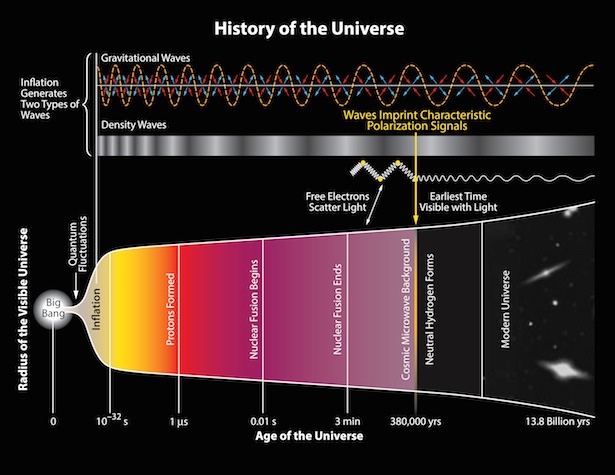
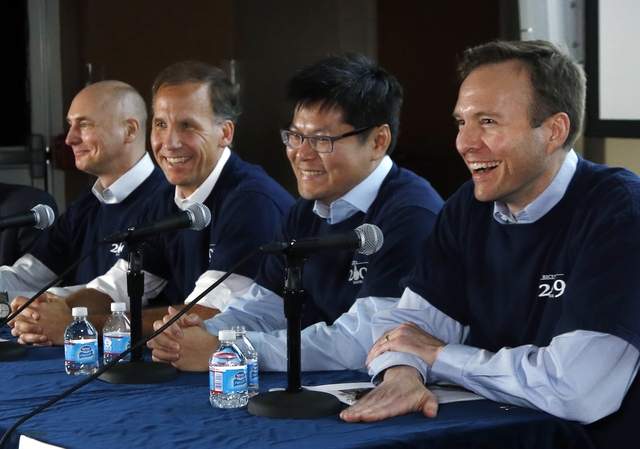
In the 1960s, the big bang theory found support in the discovery of cosmic microwave background radiation, a discovery Stephen Hawking called “the final nail in the coffin of steady state theory.” Einstein’s theory of general relativity predicted this radiation, relating it to waves of gravity that leave ripples in the fabric of an expanding universe like the ripples left in the sand by waves pounding the seashore. Earlier this year, the scientists pictured at right (along with others) discovered what seems to be new evidence for this radiation. One report said that the scientific community is “cautiously exultant,” hailing this discovery as “one of the biggest…of the past two decades.”
Viewing early evidence for the big bang, atheist-turned-agnostic astronomer Fred Hoyle famously stated, “A common sense interpretation of the facts suggests that a super-intellect has monkeyed with physics.” We know that “super-intellect” to be none other than our Creator God. I’m delighted that scientific exploration continues—discoveries about the fabric of our universe provide us with a detailed view of God’s awesome handiwork.
The reason such discoveries are being made is that the beautiful and elegant laws of physics created by God make the universe intelligible. Cosmologists are like detectives in a quest to answer the question that God posed long ago to Job: “Where were you when I laid the foundations of the world?” I find it exhilarating to study the discoveries being made by scientists. As I was reading about the recent ones, I found myself humming a worship song most of you know (here are the lyrics—give thanks that you can’t hear me humming!):
Blessing and honor, glory and power, be unto the Ancient of Days
From every nation, all of creation, bow before the Ancient of Days
I hope the scientific discoveries being made will help people see that God never intended Genesis to be read as though it is a science textbook presenting details of the processes by which the universe began and now operates. Genesis makes no mention of the big bang and cosmic inflation. What it does tell us is that the universe was created by God out of what was “formless”—like a ball of energy and light appearing suddenly out of nothing. Genesis gives, in brief, the story line of an amazing creation event. The big bang theory, which resonates with that story line, fills in the details, addressing what developed once there was something brought into existence by the Word of God from no preexisting matter.
Let me share with you what some world-famous physicists have said of the recent discoveries related to the big bang and inflation:
- “I would say it’s very likely to be correct that we are seeing a signal from inflation,” said Adrian Lee, a University of California at Berkeley cosmologist who is a leader of PolarBear, an experiment based on a mountaintop in Chile that is also searching for evidence of inflation. “But it’s such a hard measurement that we really would like to see it measured with different experiments, with different techniques, looking at different parts of the sky, to have confidence that this is really a signal from the beginning of the universe.”
- “If real, it’s magnificent,” said Harvard astrophysicist Lisa Randall.
- “Inflation—the idea of a very big burst of inflation very early on—is the most important idea in cosmology since the big bang itself,” said Michael Turner, a University of Chicago cosmologist. “If correct, this burst is the dynamite behind our big bang.”
- Princeton University astrophysicist David Spergel said after Monday’s announcement, “If true, this has revolutionary impacts for our understanding of the physics of the early universe and gives us insight into physics on really small scales.”
- Lawrence Krauss, an Arizona State University theoretical physicist, said of the new result, “It gives us a new window on the universe that takes us back to almost the very beginning of time, allowing us to turn previously metaphysical questions about our origins into scientific ones.”
- Cambridge University cosmologist professor Steven Hawking wrote, “The actual point of creation lies outside the scope of presently known laws of physics.”
- According to Professor Joseph Silk of the University of California, author of a recent book on modern cosmology, “The big bang is the modern version of the creation of the universe.”
- Professor Paul Dirac, a Nobel laureate from Cambridge University and a leading physicist of the 20th century, also an avowed atheist, said: “It is certain that the universe began at a definite time through an act of creation.” In reply, Jewish cosmologist professor Nathan Aviezer of Bar-Ilan University said: “It’s an example of Divine irony that it took atheistic scientists like Dirac…to point out the truth of the Torah. At this point I think we can say that creation is a scientific fact.”
Though most scientists do not attribute creation to the transcendent, personal agency of God as do the Bible and Christian theology, I believe that what science is discovering is compatible with the biblical account of creation. Recent discoveries in cosmology affirm that the universe had a point of beginning, which raises the question: Who or what initiated the big bang and the inflation that followed? By its very nature, science cannot answer that question, but the Bible can, and does. And so I’m smiling as I continue to hum…
Every tongue in heaven and earth, shall declare your glory
Every knee shall bow at your throne, in worship
You will be exalted oh God, and your kingdom shall not pass away
Oh Ancient of Days!
Continually humming his praises,
Joseph Tkach
PS: For comments on this topic from evangelical Christian leaders, see a recent NAE post at http://nae.net/resources/news/1205-are-science-and-faith-compatible.
Several of our pastors and ministry leaders met recently in Dallas to discuss our progress as a church planting movement. While there, the group toured the Dallas Cowboy football stadium. Here’s a picture of the group on the field, where they later knelt in prayer. Based on the Cowboy’s recent struggles, they apparently forgot to pray for the football team! (Apologies to Cowboys fans ☺)
Luann Patrickson
Retired GCI-Canada pastor George Patrickson sent in this prayer request for his wife Luann:
Recently, we received some very sobering news. Luann was experiencing pain in her back, which the family doctor thought might be a urinary tract infection. When tests showed that this was not the cause of the pain, the thought was that it might be a kidney stone. Unfortunately, the cat-scan revealed it to be something more sinister. She spent a couple of days in the hospital and after numerous tests they confirmed that she has pancreatic cancer. We have seen the oncologist twice and she will be starting chemotherapy soon. As you can imagine, this has been quite a shock to the family and we would appreciate the prayers of the church for her and our family.
Cards may be sent to:
George and Luann Patrickson 1936 Hyannic DriveNorth Vancouver, BC V7H 2E4
CANADA
Series on the Holy Spirit, part 7
In an essay entitled “Guidelines to an Understanding of the Person and Work of the Holy Spirit,” Dr. Gary Deddo offers an incarnational, Trinitarian perspective on the doctrine of the Holy Spirit. We are publishing his essay serially in seven parts. Here is the seventh and concluding part (to read other parts, click on a number: 1, 2, 3, 4, 5, 6).
Our response to the Spirit
It’s clear from the New Testament that the Holy Spirit works actively among us—both as a body and as individuals. Let me suggest that a primary aspect of this ministry of the Spirit among us is to enable us to make a full and proper response to the truth and reality of who God is and what he has done, is doing and will do in our church, our world and within us. Enabling us to make that response is the key.
The Holy Spirit unbinds our wills and unscrambles our minds and refashions our affections so we can more fully respond with all that we are to all that God is. The Spirit frees us to be receptive at every level of who we are. Sometimes it seems we think the Holy Spirit only enables us to respond emotionally. We’re human beings, and emotions are part of who we are, so the Spirit does enable us to respond emotionally to the truth and reality of who God is and who we are in him. That’s going to be a part of it. In worship the Spirit moves us to thanksgiving, praise, adoration, joy and even sorrow and repentance.
But we are also thinking beings, so the Holy Spirit also enables us to respond with our minds. The Spirit is called the Spirit of truth (John 14:17; 15:26). He is involved with our hearts and minds and so, for example, enables us to pray and praise not only with our spirits but also with our minds, that is, with understanding or intelligence (1 Corinthians 14:15). As Paul indicates in Romans 2:8, our minds are set free to be obedient to the truth. Throughout the New Testament, the heart and mind are not split but coordinated together when healthy. The Holy Spirit enables us to respond with all of what we are. There is no reason to think the working of God in and among us is divided, as if Jesus addresses our minds and the Holy Spirit addresses our emotions. We’re not compartmentalized like that. The whole of God interacts with the whole of our humanity.
Jesus assumed a whole human nature with all its aspects. Jesus is a full human being with body, mind and heart. In the Gospels we see him responding fully with all that he is to the truth and reality of his heavenly Father and his relationship to him and the Spirit. Jesus obeys in the Spirit and rejoices in the Spirit. He overcomes temptation by the Spirit. He overcomes evil by the Spirit and sets people free. He offers himself up on the cross to the Father through the Spirit (Hebrews 9:14). Jesus lives his fully human life in and by the Spirit.
So, when the Spirit of Jesus comes upon us, he enables us to respond fully to the truth and reality of who God is and who we are in relationship to him with all we are and have. If there’s part of us not yet responding, whether the body, mind or heart, the Holy Spirit will work to bring us to the point that we do. The Holy Spirit doesn’t divide us, but heals and makes us whole, giving us human integrity before our Lord and God.
The objective work of the Holy Spirit in us
We should not align the Holy Spirit exclusively with what is subjective, internal, or affective in human experience. Yes, the Holy Spirit works in us, works in our subjectivity but not as our subjectivity (our subjective states). The Holy Spirit cannot be identified with our subjectivity—our feelings, emotions or even our consciences, as if they were identical. There is no denying that the Spirit works in our subjectivity. If not, we would remain in bondage to our fallen, rebellious wills and hard hearts and our self-justifying and rationalizing minds. He does work in our subjectivity, but does so objectively, so that we can respond with our whole being to the truth and reality of who God is and who we are in relationship to God.
The Holy Spirit objects to our false, resistant, self-justifying subjective orientations. The Holy Spirit is not the subjective aspect of human beings that can be shaped and formed anyway we like, made to say what we want, made to reflect our own preferences, prejudices, biases and desires. The Holy Spirit has a particular character, mind, will, purpose, desire and heart, which is identical to that of Jesus Christ. We have no power over the Holy Spirit to recreate him in our own image. The Holy Spirit has his own objective reality, which works within our subjectivity to open our eyes, minds and hearts to God.
The Holy Spirit, then, is a healer who brings the whole of human being together from the inside out. He does not split us up. He does not say to us, “I’m just in charge of your emotions, your imagination and your desires. What you think and believe and come to know, the rational part, well, Jesus takes care of that. I don’t know anything about that.” The Holy Spirit does not divide up human being into compartments, but harmonizes the internal with the external, sharing with us the reestablished integrity of Jesus’ sanctified humanity.
Humanizes us
A final aspect of the ministry of the Holy Spirit correlates with his ministry to make us whole in body, soul and spirit. The Holy Spirit’s ministry is to make us more fully human, like Jesus, the one in whose image we were created and are being renewed or transformed (Colossians 3:10; 2 Corinthians 3:18). The Holy Spirit shares with us the sanctified humanity of Jesus, which makes us fully human, more completely human, more personal, filling us up with the fruit of the Spirit. True spirituality is mature humanity in full and right relationship with God.
So we can say the Holy Spirit humanizes us by making us share in the glorified humanity of Christ. In the process, he brings us to have humility before God. The transformation he brings will involve our confession that God is God and we are not; that we are entirely dependent upon God; that we need the grace of God and that we must hand over to him all our sin in repentance and our whole selves in faith. But in doing so, the Spirit will not submit us to humiliation. He will not make us feel less than human or cause us to regret we were ever human or to think that God despises our humanity and creaturely limits.
There is a huge difference between humility and humiliation. Putting it this way may be surprising since some people teach that humility in the Spirit comes by way of our humiliation. Unfortunately, it’s sometimes taught that the ministry of the Holy Spirit not only focuses exclusively on the subjective side of human being, but requires that we set aside our rationality or intelligence and act in less than human ways, perhaps like an animal or a person who has lost self-control (like a drunk person). It would be strange indeed for the Spirit to lead persons to lose self-control and act in ways beneath human being, since part of the fruit of the Spirit is precisely self-control (Galatians 5:23). The Holy Spirit is the Spirit of Jesus, who came to bring us into conformity with himself. He was indeed humble before the Father and the Spirit. But he was never treated in a way that denigrated his humanity. Nor did he respond to God in ways that denied a healthy and whole humanity. Rather Jesus’ humanity came to be glorified. He fulfilled human nature and showed us what it really means to be a human being.
Given who the Spirit is and what we know of his ministry, we can affirm that the Spirit does not dehumanize or depersonalize us. Yes, we will be led into humility before God. But humility is a deeply personal and human thing. It’s not alien to humanity, but a fruit of human maturity in relationship to God. In contrast, being humiliated involves being treated as less than a person, less than fully human, and that kind of relationship is really the opposite of the kind of ministry Jesus performed in the power of the Spirit. Abject humiliation does not represent the kind of relationship Jesus had with his heavenly Father. Even though his enemies, especially at the end, attempted to humiliate him to the fullest extent they could, the end result was not his humiliation in the sense of him collapsing into a dehumanized heap of regret and shame for taking on humanity. Rather, Jesus was “the pioneer and perfecter of our faith, who for the sake of the joy that was set before him endured the cross, disregarding its shame, and has taken his seat at the right hand of the throne of God” (Hebrews 12:2). Jesus was exalted in his bodily (human) resurrection and ascension. He calls us his brothers and sisters and is not ashamed of us (Hebrews 2:11). Jesus shares with us his glorified and perfected humanity by the Spirit.
Rather than denigrating us, the Holy Spirit humanizes us. To be fully spiritual is not, on the one hand, to become non-human, or on the other, to become super-spiritual disembodied ghosts, vapors or ethereal gasses distributed throughout the universe. We should get our idea of spirituality in and through the life of Jesus lived out in the Holy Spirit. True spirituality is a human being fully responding to the truth of who God is, firing on every cylinder, responding totally to who God is and who we are in relationship to him. True spirituality means responding in praise and prayer and in every other way of service and love. The Holy Spirit is the humanizing Spirit, sharing with us the perfect humanity of Jesus. His presence and working in our lives demonstrates just that kind of spirituality and not another.
What about the Spirit in those not yet repenting and believing?
So far we’ve addressed the Spirit’s ministry to people who are responsive to his work in their lives. But what about nonbelievers? Does the Spirit work with those who are not Christians? The answer must be yes. No one becomes a believing person except in response to the Spirit’s ministry. Without contact with the Spirit there is no conversion to Christ. If no one comes to the Father except by the Son who sends the Spirit and it is the Spirit who opens eyes, convicts of the need for forgiveness and life in Christ, then no one becomes a conscious member of the Body of Christ except the Spirit draws them. The Spirit must work on those not yet believing and responding or no one would ever become Christian, no one could enter into their salvation. The Spirit goes out after people to bring them to Christ and so to the Father. That is essential to the Spirit’s mission in the world. We can see this in the conversion of Saul/Paul in the book of Acts in a dramatic way. The Spirit has a ministry to those not yet believing as well as a ministry to those who are believing.
A related issue is whether we can say that the Spirit is “in” everyone. While there is not a lot about this in Scripture, there is enough for us to address this issue. If by “in” everyone we mean in the deepest most personal and intensive way that the Spirit ministers, I think we have to say no. Jesus told some of those following him that the Spirit was “with” them, but soon would be “in” them (John 14:17). At one point in the upper room, Jesus breathes on the disciples the Holy Spirit, leading to their having the Spirit in a way they didn’t previously. But Jesus also tells them to wait for the coming of the Spirit in Jerusalem, indicating that there is more yet to come involving the Spirit. The Spirit became present at Pentecost in a new and different way. So the Spirit can be present in a variety of ways, with a range of intensities, and we could say at a number of different levels of depth.
Inhabiting, or dwelling in
One of the ways of speaking of the Spirit’s presence in the New Testament is through use of the word that can be translated “dwelling in” or “inhabiting.” This coming and indwelling of the Spirit in persons is viewed as the fulfillment of the promise God made through the prophets Joel (Joel 2:28) and Ezekiel (Ezekiel 18:31; 36:26) as indicated by Peter in Acts 2:17. The biblical notion of the Spirit’s “dwelling in” or “inhabiting” is exclusively applied to those who are believing, receptive and responsive to the leading and working of the Spirit (Romans 8:9, 11; 1 Corinthians 3:16). The idea of this indwelling has to do with the most intense, personal and abiding presence of the Holy Spirit in persons individually and in the community of believers collectively.
But this special presence of the Spirit does not mean that the Spirit is absent from everyone else. Clearly the Spirit was with those in ancient Israel, and sometimes in special ways upon the prophets and even some of the skilled craftsmen who worked on the Tabernacle and Temple. But that kind of presence of the Spirit did not represent God’s ultimate promise of the Spirit’s indwelling. That only occurred at Pentecost in the lives of those who were receptive to the gospel and the presence and working of the Spirit. Further, we can see that the dynamic nature of relationship to the Spirit continues even at the deepest level of indwelling. In that regard, note the teaching that those who are part of the believing body are not to quench or grieve the Spirit (1 Thessalonians 5:19; Ephesians 4:30) but rather are to be continually filled with the Spirit (Ephesians 5:18).
Clearly, we can say the Holy Spirit can be present to anyone and everyone. He is God’s presence throughout the creation. We also can say that the Spirit can work in anyone and everyone. His ministry is to open people’s minds, soften their hearts, open their eyes to truth, unbind their resistant wills and convict them of the need for forgiveness and the life of salvation that only comes from God by grace. The Spirit delivers to unbelieving people the gift of repentance and faith, hope and love. Doing so requires working within them, within their persons, in their subjectivity. So we can say that the Spirit works in them and so is present to them in that way. However, that kind of inner working does not represent the promised indwelling that comes only through receiving Christ in faith in response to the promptings of the Spirit.
In Christ, united to Christ by the Spirit
This seems to explain why in the New Testament only those who are receptive to the Spirit, not resistant, and those who respond with repentance, faith, hope and love to the gospel of Jesus Christ are said to be “in” Christ, or to dwell “in the Lord.” They alone are said to be united to Christ (1 Corinthians 6:17). This relationship of Christ with his people is compared to marital unity (Ephesians 5:23; Revelation 19:7; 21:9; 22:17). The most intense, intimate, deep and personal unity described in the New Testament is reserved for those who as believers are said to be members of the Body of Christ, united to Jesus as the head, just as the body of a living being is united to its head.
So, by means of the use of certain words and images, the New Testament makes a distinction between the Spirit’s relationship with those who are receptive and open to the ministry of the Spirit (believers) and those who are not yet responsive (non-believers). How the Spirit is present (whether or not he is indwelling or inhabiting a person), will involve whether or not that person is receptive to the gospel and the ministry of the Spirit to receive it and welcome it. How one responds to the ministry of the Holy Spirit does make a difference in the kind or quality of relationship they have with the Spirit and thus with the Father and the Son.
But such a distinction should not be construed as meaning that the Holy Spirit is not for all persons, is not capable of ministering in and to all persons at the deepest level, speaking to their individual human spirits. The Holy Spirit is “for all” in just the same way that Jesus Christ is for everyone who was created through him. The Father sends the Spirit for the same purpose as he sent the Son. But the Spirit is able to be present in a range of ways. This fact is represented in biblical understanding and so we have to account for it in our understanding as well.[1]
What about the Spirit in other religions?
What can we say about the Holy Spirit’s ministry in other religions? As an extension of what we have just covered, we can say that no religion itself can keep the Holy Spirit out or away from people. The Holy Spirit is God’s sovereign grace at work. He can be present to anyone, anywhere without becoming polluted, just as we see take place in Jesus presence among sinners. The Spirit is present to bring to bear all the fruits of reconciliation, accomplished for all humanity in Christ. So in those situations where the official religion being practiced is hostile to the gospel and unreceptive to Christ, the Spirit will nevertheless be present and working within against those points of resistance. The non-Christian religion itself will not be responsible or earn any credit for the presence and working of the Spirit. If hostile, the religion is actually an impediment to the Spirit’s working, an obstacle to receptivity to the ministry of the Spirit of Jesus. However, that does not stop the Holy Spirit. He will work to bring individuals and groups out of bondage to false ideas about God and about their relationship to God. The Spirit will work to open people’s minds and hearts to be receptive to God’s grace, love, faith and hope. He will work to draw people to a humble repentance and a dependence upon some kind of grace.
Individuals and groups can be drawn by the Spirit even while remaining outwardly a part of their non- or anti-Christian religious community. In that case, the Spirit will be making “heretics” within that religion. He will be leading individuals or sub-groups within such groups to take exception to at least some of what they have been taught by their religion. These persons may not know that they have become willing to follow the Spirit of Jesus. The Spirit may be anonymous to them, especially at first. But they, in their spirits, will have become responsive and receptive to the promptings of the Holy Spirit of Jesus.
People in this state can be said to have implicit faith, not explicit faith. There can be made an analogy between these people and those of faith in the Old Testament, whose faith in Jesus was not explicit. Although they did not know Jesus by name, nor of the nature of his future work, they nevertheless lived by faith and repentance and trusted in the covenant love and free grace of God to renew it when they broke it. They didn’t know exactly how God’s covenant was going to be fulfilled, but they knew and trusted and hoped it would somehow be fulfilled. That’s how the New Testament depicts these Old Testament persons of faith. And on the other side of their death, they will see how the promises they had hoped in were explicitly fulfilled. These persons are not excluded from God’s salvation. So too, if through no fault of their own, persons responsive to the even anonymous ministry of the Holy Spirit do not come to have explicit faith, there is no reason to believe that they will not be included in God’s ultimate salvation. Such persons have not committed the absolute and complete repudiation (blasphemy) of the Spirit, but have been welcoming and receptive. Their implicit faith will become explicit as soon as it is made possible.[2]
It is normally God’s will for all who have implicit faith to come to have explicit faith in this life. After all, is it not true that everyone who comes to have explicit faith, first had, at least for a moment, implicit faith? But faith becomes explicit, it seems, only if and when there is a conscious and explicit proclamation of the gospel so that in the hearing of it, it is welcomed and received. And where there is implicit faith, the gospel is always welcomed and received, since there has already been a responsiveness to the Spirit that is working even as these individuals hear an explicit announcement of the gospel. There are numerous missionary stories that corroborate this kind of scenario. People have somehow become ready to receive the proclamation of the gospel before any missionary arrived. So when the explicit gospel is proclaimed, it is recognized as fulfilling what they have been waiting for. Well, we know how this comes about—by the Spirit. That’s how they were prepared.[3]
But it may be the case that in not every instance where there is implicit faith engendered by the Holy Spirit that God brings about an opportunity for that faith to become explicit in this life. It could be that God sees to it that this never comes about. It could be that in every case where there is genuine implicit faith, God may send dreams or angels or miraculously appearing evangelists, like Philip with the Ethiopian, so that their implicit faith can become explicit through a conscious testimony to Christ.[4] But we cannot know about these situations. Knowing how God works in every case does not practically concern us. We do not need to know about situations in which we have no part to play. We do not need a final theory as to how things will necessarily play out in situations in which we have no part. Rather, our ministry is to serve in ways that count on the working of the Holy Spirit within people so that implicit faith can become joyfully explicit. In that way, our and their joy and thanksgiving will be increased. They will become members of the Body of Christ (Christians) and be able to join in explicit worship and consciously bear witness to God so that others can also come to have explicit faith as well. But in every case, we can rest assured that God will, one way or another, take care of all those situations where faith is implicit because he is merciful and faithful. He always acts on the basis of his sovereign grace, operating through the faithful working of the Holy Spirit.
We now come to the end of this series on the Holy Spirit. Not all questions have been answered. Not all the explanations given have been complete. But hopefully, additional understanding has been gained of some of the fundamental concerns we have regarding the person and work of the Holy Spirit.
Endnotes
[1] Sometimes it is said that by virtue of the Incarnation, all humanity is “united” to (or “in union with”) Christ. While true in a certain way, this can be misunderstood. It must be noted that the different kinds of relationships described in Scripture involve different kinds of unity/union that should not be confused. First, there is the unity between the eternal divine Persons, the Trinitarian unity. Second, there is the unity of the Son of God with all human nature forged by the grace of God in the Incarnation, called in formal theology the hypostatic union. This unity is a completed, once-and-for-all connection between Christ’s human nature and the human nature of all persons. That is why Jesus is identified as the new Adam. Third, there is the unity of human persons with Christ brought about by the Spirit but fulfilled only as human persons are receptive to the ministry of the Holy Spirit and respond to the promptings of the Spirit to welcome his grace and repent and share in the faith, hope and love of Christ.
The important point to remember here is that the incarnational union does not automatically or mechanically or causally guarantee everyone’s personal and spiritual union with Christ by the Spirit. The incarnational union is the basis (or call it the platform), the foundational reality for the spiritual union that comes as people receive the gift of the Spirit and share in the glorified human nature of Christ and so become more and more like him. So there could be no personal, spiritual union were there not the union of Christ with human nature forged in the Incarnation. But the one doesn’t cause or absolutely guarantee the other—they are distinct kinds of union.
[2] On this topic there is controversy that can get rather heated. There are churches and teachers who insist that faith must be explicit in this life for anyone to enter into eternal life. But on the other side, there are those who affirm that there is no significance to the difference between implicit and explicit faith and that the Holy Spirit works positively in many religions with no interest in bringing persons to explicit faith in Jesus, either now or in eternity. This later view has little to no support in orthodox Christian teaching grounded in Scripture and held down through history. The view expressed in this article is different from both of these views.
[3] However, it should be noted that the position expounded here does not mean that every claim and practice in every non-Christian religion is evil or entirely wrong. There may be partial reflections of truth that do coincide with the revelation in Jesus Christ according to Scripture. This coincidence too, may be a product of the working of the Spirit. But note, it is on the basis of the biblical revelation that we can discern what will need to be set aside and what preserved and seen as fulfilled in Christ. Without that normative revelation, it is impossible for anyone to authoritatively discriminate between what is true and what is false and misleading. However, as noted above, the Holy Spirit can lead persons to be discriminating anyway, although their sense of judgment will likely seem to them to be personal, esoteric and perhaps simply subjective since they won’t have access, at that point, to the explicit, objective revelation in Christ according to Scripture to ground and validate their moral/spiritual discernment.
[4] This must be the case if explicit faith in this life is an absolute requirement for receiving salvation, as some believe. Otherwise, creaturely limitations limit God’s grace and mercy. God could not, then, be more faithful than we are! If that is the case, then there is no such thing as grace and God cannot exercise sovereign grace, cannot be faithful in every situation. God is, in that view, dependent upon and limited to creaturely limits and obstacles, since there would be people he would want to receive eternal life, but creaturely obstacles got in the way that he was unable to work around to bring them to explicit faith in this life and make their salvation possible. But since there are exceptions to the need for explicit faith recounted in Scripture, we do not necessarily have to affirm such a theory that God always makes implicit faith explicit—nor do we need, necessarily, to deny it. One way or another, God will be faithful! That we can affirm with no reservation.
Partners in a church planting movement
Dear Brothers and Sisters in Christ,
 As Gary Deddo points out, when it comes to searching out answers to life’s big questions, it’s vital to begin with the most important question of all: “Who is God?” Doing so reflects the apostle Paul’s teaching that God determines reality, “for in him we live and move and have our being” (Acts 17:28).
As Gary Deddo points out, when it comes to searching out answers to life’s big questions, it’s vital to begin with the most important question of all: “Who is God?” Doing so reflects the apostle Paul’s teaching that God determines reality, “for in him we live and move and have our being” (Acts 17:28).
God’s continuing mission is to help all people live according to that reality—to come into right relationship (communion) with him. This mission begins with God’s own perichoresis, meaning “mutual indwelling.” The word was coined by early church teachers to represent the unique oneness of the triune God. Jesus described it this way: “I am in the Father and the Father is in me” (John 14:10-11; 17:21). The Father’s life is with and in the Son and the Son’s life is with and in the Father. The Father, Son and Spirit are with, in and for each other. The three Divine Persons are so united in being that they act as one, pursuing together a mission to draw humanity (and all the cosmos) into their triune communion.
God calls the church to participate with him in that mission. In Worship, Community and the Triune God of Grace, James B. Torrance put it this way: “Through our union with Christ we share in his communion with the Father and in his mission from the Father to bring others into that communion… The mission of the church is the gift of participating through the Holy Spirit in the Son’s mission from the Father to the world.” In Atonement: the Person and Work of Christ, Thomas F. Torrance put it this way: “Because the church is filled with the one universal Spirit of divine love, it is caught up in the universal movement of that love that ceaselessly flows from God through Jesus Christ out into all the world.”
The problems we see in the world stem from living and thinking in ways not oriented toward God. God, who is love (1 John 4:8) is who we need. If we lived into that reality, most problems would quickly diminish. God, in love, reaches out to draw humanity into communion with himself. Toward that end, he has formed the church to be his representatives in leading creation to worship him as Creator, Reconciler and Redeemer. God calls the church together to receive from him his life with praise, prayer and thanksgiving and then sends them out to the world to pass on what they have received. In that way, the church serves as a living sign that points to the great reconciling and redemptive work that the Father has accomplished in Christ.
The church participates with God in this mission as it leads people to faith in God—a faith that leads them to share in a worshiping community that gathers together then reaches out to the world. In GCI, we describe our participation in that mission as Living and sharing the gospel, which brings forth All kinds of churches for all kinds of people in all kinds of places. Though we are small, God has given us a wide reach. We have churches in jungles, prisons, refugee camps and even a garbage dump. God has made us a church that lives and shares the gospel in all kinds of places!
As churches, our ministries are true participation in the mission of God as they communicate in word and deed the reality of who God is and what he is doing. That reality is good news (gospel) from beginning to end. Sadly, some churches stray from the gospel by falling into one of two ditches. The first is legalism—thinking that the gospel is about a transaction in which we earn something from God. The second ditch is approaching the gospel as an esoteric, mystical system that is inaccessible to outsiders. Those in the first ditch tend to speak of mission in business terms. An example is the health and wealth gospel, which often manipulates people using false hope and guilt. Those in the second ditch often speak of mission using esoteric terms. I’m not referring here to the appropriate use of theological terms, but to the use of strange-sounding, in-speak phrases such as, “The Lord spoke to me.” Though such phrases might make sense to us, they are easily misunderstood by non-Christians and thus tend to obscure the nature of God (see Gary Deddo’s article on the Holy Spirit linked under the Church Development category at left) and unhelpfully complicate (and even obscure) the simplicity of the gospel message that we are called to proclaim.
In times past, many of us spent time in one or the other (and sometimes both) ditches. We erroneously tried to build our fellowship using a transactional, business model. We referred to our ministries as “programs” and our pastors as “college representatives.” Also, we often used esoteric phrases unintelligible outside our fellowship. I recall when one of my neighbors accompanied Tammy and me to church. On the drive home he asked, “Joe, I know what a tithe is, but what is second tithe?” He also asked, “What is the Feast of Tabernacles? and “What kind of restaurant could stay in business serving unclean meat?”
I thank God we’re no longer in those ditches. Today our mission is to live and share the gospel in ways that lead to all kinds of churches for all kinds of people in all kinds of places. I pray we all grow in our participation in that mission. That all our churches have opportunity to do so became clearer to me in a recent conversation with Greg Williams, who in January will become director of GCI-USA Church Administration and Development (CAD). Greg noted that we’ve tended to look at church planting as the responsibility of our Church Multiplication Ministries (CMM) group led by Randy Bloom. CMM has laid for us a solid foundation for church planting. However, rather than looking at one ministry and a small group of people as the focus of our church planting, we need to see that church planting is a fundamental focus of the mission that we all are called to share in. In short, we need to see ourselves as church planters—partners in a church planting movement.
Every congregation, no matter its size, age distribution, financial resources, or other limiting circumstances, can be a partner in this movement. Each can make a valuable contribution. Notice here my emphasis on what we do together on mission—participating as one church family with Jesus as he engages humanity, drawing them to himself. Note also that mission precedes and leads to ministry (but ministry doesn’t always lead to mission). That’s why I want us to emphasize mission. Let’s examine everything we do at the congregational and denominational levels from the viewpoint of mission. Let’s ask: How does this ministry (program, publication, etc.) contribute to sharing in God’s mission to the world?
At times we’ve referred affectionately to our very small, often aging congregations as “legacy churches.” We’ve stopped doing so because it implies that they don’t have a meaningful, ongoing part in the mission of God. But that’s not what we believe. We value every congregation, no matter how small and no matter the age of its members. We value every member, no matter their age or other limiting circumstances. We believe that each congregation and every member can play a meaningful, important part in what God is doing to make of us a church planting movement. In fact, he already has! Note what Greg wrote recently:
Our U.S. congregations already are partners in this church planting movement through the income they provide to the denomination through our apportionment system. A growing number also partner through participation in a church planting network and donations to our GCnext domestic mission fund. Others are providing a home base for one of our interns. Some are directly starting new churches (serving as a “mother church” in the movement). Others help staff our Generations Ministries camps and mission trips where emerging leaders are helped to hear God’s call into mission. All are included. All have a part. All are important.
Greg and his team recently came up with a guiding motto for CAD: We are a team of churches and ministries partnered together in a church-planting movement. This excites me, because it speaks to our union and communion with the triune God, and our participation in what Jesus is doing in the power of the Spirit to fulfill the Father’s mission to the world. I’m confident this church planting focus will excite you too, as together we participate in the mission of God.
Living in his reality,
Joseph Tkach
P.S. This issue focuses on our calling to participate in God’s mission to the world. Gary Deddo addresses this topic as he concludes his series on the Holy Spirit, and note Dan Rogers’ comments on the topic in a video at http://youtu.be/oXF4uMNZb0k. Concerning our progress toward being a church planting movement, I recently participated in the first anniversary celebration at Grace Communion Fellowship. This GCI congregation was planted in Southern California a year ago by Angie and Saddie Tabin, with active participation from CMM and multiple GCI congregations partnered in one of our church planting networks. About 100 people attended the anniversary celebration—here are some pictures:




